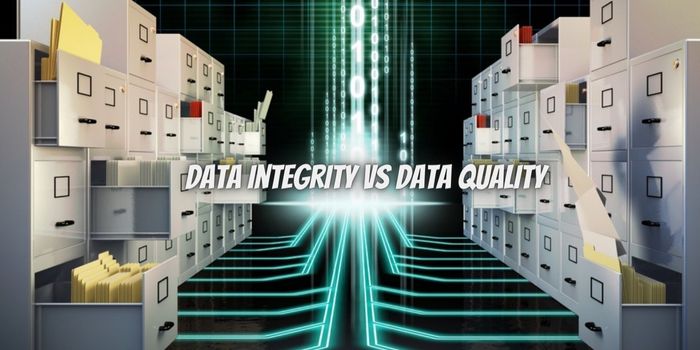In the world of data management, two crucial concepts often come up – data integrity vs data quality. You might have heard these terms thrown around, but do you really understand the key difference between them?
In this article, we’ll delve into the heart of this matter, shedding light on why both data integrity and data quality are essential for your business’s success. By the end, you’ll have a clear understanding of these two concepts and how they impact your data-driven decisions.
What Is Data Integrity?
Data integrity means how correct, steady, and trustworthy the data is. It’s like making sure your data doesn’t get messed up or changed by accident, so it stays the way it was from the beginning.
In simple terms, data integrity keeps your data on the right track, making sure it’s accurate and dependable. It’s like having a lock on your data to prevent it from getting mixed up or losing its original quality. This way, you can count on your data to be true and unchanged, which is important for making good decisions in business or any other use.
Why Does Data Integrity Matter?
Data integrity is important because it keeps your data safe from mistakes and things that don’t match. When your data is right and stays the same, you can make smart choices, avoid problems, and do your work better.
In simple words, data integrity makes sure that your data is like a solid base you can trust. It’s like building a strong house on a firm foundation because you know it won’t wobble or collapse. So, you can make business decisions with confidence, knowing that your data is accurate and won’t lead you in the wrong direction.
What Is Data Quality?
Data quality measures how well data meets the needs of its intended users. It looks at things like making sure the data is complete, meaning it has all the necessary parts. It also checks if the data is related to what’s important in a particular situation, and it makes sure the data doesn’t change too much, so it stays reliable and doesn’t confuse people.
So, data quality is like tailoring data to be just right for the people who will use it, ensuring it has everything they need, is on-topic, and doesn’t keep changing unexpectedly to avoid data quality issues. This way, the data becomes helpful for those who rely on it.
Why Does Data Quality Matter?
Data quality is vital because it has a big impact on the decisions we make. If the data isn’t good, your choices can go wrong, and that can be expensive.
However, when the data is of high quality, it helps us make better decisions and get better results. So, if the data is bad, we can mess up, but if it’s good, we can make smarter choices and get good results. So, having good data quality is like having a trusted guide that helps us make the right moves and avoid costly errors in our business or other activities.
Bridging the Gap
Data integrity and data quality, while not the same, are like partners that collaborate closely to handle data in the best way. You can picture data integrity as the protector of data truth, making sure it’s always correct and doesn’t change by accident. On the other side, data quality is like the one who makes sure the data is really useful and fits the people who need it.
Why Both Matter
Understanding the distinction between data integrity and data quality is essential because both factors play a significant role in your business’s success. Data integrity forms the foundation of reliable and trustworthy data, while data quality ensures that the data is not only reliable but also useful.
Imagine having data with high integrity but poor quality. It might be accurate, but if it lacks relevance or completeness, it won’t serve its intended purpose effectively. On the other hand, high-quality data that lacks integrity can lead to misguided decisions.
To illustrate this, let’s consider a healthcare database. Data integrity ensures that the patient records remain accurate and unaltered, preventing critical errors in treatment. Data quality ensures that the patient records contain all relevant information, making it easier for healthcare professionals to provide comprehensive care.
If you want to keep your data really accurate and useful, think about using technology solutions like virtual data center. These can play a vital role in creating a robust data environment.
Striking Balance Between Data Integrity and Data Quality
Balancing data integrity and data quality is a bit like finding your way in the data world. It’s about keeping data accurate and making it really helpful. This article will guide you on this path, so your data works great for your business. So, let’s explore this balancing act to help you make the most of your data:
Invest in Data Governance
Implement robust data governance practices that encompass data integrity and data quality. This includes defining data standards, ensuring data security, and regular data validation.
Automate Data Quality Checks
These tools can help you proactively identify and rectify data issues. It ensures that your business operates with accurate data and dependable information at its core, which is essential for success in a data-driven world.
Educate Your Team
Ensure that your team understands the importance of both data integrity and data quality. Training and awareness can go a long way toward maintaining these aspects.
Regular Audits
Conduct regular audits to assess the status of your data. This includes checking for data integrity and quality and identifying areas that need improvement.
The Power of Data Integrity vs Data Quality
In the grand scheme of data management, data integrity and data quality are not competing concepts but complementary ones. To succeed in the data-driven era, businesses must appreciate and invest in both.
By understanding and nurturing this symbiotic relationship between data integrity vs data quality, you pave the way for more accurate, reliable, and actionable insights. And with this, you can truly harness the power of data to drive your business forward!
Did you find this article helpful? Browse the rest of our site for more insights!




